#that’s the Watsonian angle
Text
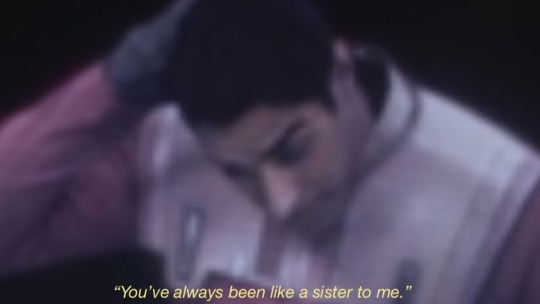
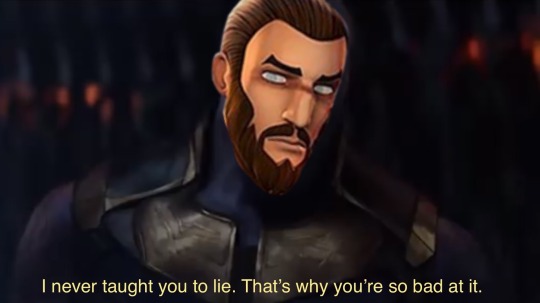
#credit to @jedimandalorian for that close-up screencap of Ezra#it’s a perfect shot honestly 🤣#that’s his body language while saying something he and Sabine both know to be hilariously untrue????#you know when they saw each other in the WBW Ezra should have asked Palpatine for tips on how to tell a convincing lie#golden opportunity right there!#but instead he did…this#that’s the Watsonian angle#but here’s the Doylistic take on all this: are we SUPPOSED to believe that Ezra means that?????????#is Dave trying to gaslight us because we all saw that crush back in S1#and you’ve gotta pull off some incredible mental gymnastics to fool yourself into thinking Ezra’s fumble with Alrich…#…doesn’t mean he’s still crushing#(although it’s way more than a juvenile crush at that point)#anyway I guess we’re gonna find out what nasty tricks Cowboy Man has up his sleeve#sabezra#ezra bridger#sabine wren#kanan jarrus#ahsoka spoilers#ahsoka series#sabezra memes
293 notes
·
View notes
Note
The more I think about it, the claim Edelgard wants to be a goddess/replace the goddess from Dimitri and Seteth makes more sense. Her believing only she can fix the world's problems, believing the world is too sinful because of "those eeevil lizard people", crushing anyone who dares oppose her and seeing human sacrifices as a means to an end/collateral damage. Heck you can see her war as a rapture and those who don't agree with her burn for a thousand years or in the case get killed/vanquished. And after her war if she wins, then she reforms a church under her name and in Nopes she does the exact the same thing after getting rid of the Slithers with Rhea. And considering how cultish her stans irl behave while trying to claim that they're "good people", yeah it all clicks.
The thing is,
The "Goddess" or at least what we know/heard of her didn't even act like Supreme Leader did.
Sure, sources on Sothis's time in Fodlan are biased, either we're told anything about her by Rhea, or by the Mole People.
But I agree, the game gives us some clues about what Supreme Leader wants to be, at least in Tru Piss. With her Manu support, she becomes the figure people look up to and aspire to be, the source of strength the Goddess and the CoS previously were. You also have the explore sections in the monastery, and how she's found where Rhea used to be when she was doing her archbishop things (the audience chambers iirc?), the CoS being "reformed under her supervision" and the final straw on the camel's back is her ending mural.
The rest is her messiah complex - partly fueled by Adrestian nationalism - and her stubborness, Supreme Leader will walk on her path and refuse to look back or even reconsider, no matter the obstacles standing before her, you are either on her side, or an obstacle needing to be removed.
As for the irl devoted fans, lol, I won't consider their behaviour in an analysis of the character, but if we are to talk about the BESF in Nopes, they are also sure they're doing a favor to the world/Fodlan while ignoring a good part of said Fodlan. Nopes!Ferdie comes to mind, with his nonsense about the Kingdom having more crusted generals, or the general fuckery that is the alliance with the Federation, or people being gung ho and looking forward to sack the monastery/cities/Faerghus to earn some fame.
#anon#replies#what i like about supreme leader is her supposed charisma#sure it doesn't work at all if you take into consideration the world and think from a doylist and even watsonian angle#but in the end the games especially nopes portray how the usually attentive BESF suddenly turn their brain on off mode#whenever they join Supreme Leader even if her words don't match what the world is telling them#something like you can buy anything from someone who knows how to talk#with all the issues and questions this raises of course#I also like how her determination that is usually a good trait#is shown here in excess to be something negative#at least in AM#funny how both Willy and Supreme Leader had a strong will that Rhea notices#but their drive was most likely different even if on paper they achieved the same thing#both Supreme Leader and Claude strike me in the games as people who want to win over people's hearts#be the one they love and revere instead of the supposed Church#but they don't know how to do it#FE16#3 Nopes
14 notes
·
View notes
Text
”Why does Master Splinter barely ever seem to leave the lair in missions to help the turtles in the 2012 series? He’s an adult!”
Because it’s a kids show so the primary solver of the problems involved is obviously going to be the kids. Having an adult swoop in and solve everything/baby sit all the time would probably be kind of boring for the intended audience. Boring for everyone actually. Next question.
#TMNT 2012#I mean a Watsonian answer could be trauma or whatever and that this family needs counselling but can’t get it because of the mutant thing#but the primary viewing audience is probably ten year olds who think fifteen is like close enough to being potentially capable#Like do I think ATLA did far better by the whole kids who have to fight angle?#of course: and the romance was much better too in atla for that matter#but we have to remember that adults ranging from their twenties to forties aren’t the primary audience in either case#2012 is the animated TMNT version I have the most issues with but some of the common criticisms aren’t great either#Like I think it’s important for kids to see themselves as capable#And sometimes we adults just also kind of suck#like the ones who animated april to have her ass showing when tied up for instance#TLDR: there are legitimate problems with this show but like come on#(Also the idea adults will always be perfectly capable of everything is kind of immature#Like idk I don’t see splinter being able to do donatellos tech capabilities)#Like I think rise did far better with the whole imperfect splinter thing but you know#2012 sometimes feels like that nutty first draft of a fanfic where you’re throwing everything to the wall to see what works#it’s like Nickelodeons practice series I guess#rise is already an improvement and maybe so will mutant mayhem be who knows#But any splinter works best in missions when they are reserved for those which are big deals#like it indicates it’s serious business if a splinter gets involved
33 notes
·
View notes
Text
OC Name Meanings
Fuck it. I'm explaining everyone's names and kanji because I Do What I Want. If there are any misspellings or misinterpretations I apologize I do not know Japanese and regular English can sometimes make my adhd head spin
Akane (茜): "dark red" color, same as her hair
Hidaka (日高): "day, sun" and "high up," reflective of her powers and her hero name, Sunwing
Yumi (友美): "friend" and "beautiful," although seen as ironic is reflective of her inner nature
Kemonoshi (獣志): "beast," representing her powers, and "determination, ambition," her drive to be a hero despite her heteromorphic "beastial" appearance
Haruto (晴人): "sunny" and "person," ironic since he's so closed-off and withdrawn most of the time
Natsumi (夏美): "summer," matching the rest of her family's "warm" name meanings and also she and Haruto met during the summer, and "beautiful," again (I never said I was the most creative with names)
Hibiki (響): "sound, echo" reflexive of her powers (also the same kanji as "kyo" in Jiro's given name, but with a different reading)
Katoyo (か豊): "very" and "abundant," also just the common kanji used for the word "rich" but reversed, seeing as how she wants to reverse the rich-poor dichotomy in hero society
Ketsu (血): "blood," actually an alias since he forgot his given name for the most part
Aryu (安流): "peace," ironic since he's a villain and a nasty one at that, and "flow," as "ryuketsu" translates to "bloodshed" making his name read literally as "peace and bloodshed"
Sei (性): "person, self"
Fushoku (腐食): "corrosion," referring to his Quirk, also an alias as "fushoku-sei" literally translates to "corrosive"
Shiro (白): "white," same as his hair
Kitaguchi (北口): "north" and "mouth, entrance," reflective of his powers, also simple kanji to write out as he's a pretty simple person
Hitomi (瞳): "pupil of the eye," something that expands or retracts in response to light, similar to her powers
Nakamura (中村): "middle" and "village," since she lives in between Shiro and Akane's houses in their neighborhood, also a fairly common surname because, like Midoriya, she's seen as being plain
Noboru (登): "ascending," in reference to the moon rising
Meian (明暗): "light and darkness," in reference to his Quirk (honestly surprised I haven't seen another shadow/dark-themed OC with this name already), also "light and darkness ascending" sounds dramatic in reference to his emo-esque nature
Yasuri (康莉): "peaceful," ironic because she is definitely not that, and "white jasmine," which means "friendly" or "graceful" in hanakotoba, the Japanese language of flowers, seemingly also ironic but is reflective of her inner nature
Kato (加藤): "increase" and "wisteria," reflective of her family's plant-based Quirks
Mariko (真理子): "genuine" and "reason," owing to her down-to-earth and dutiful nature, and "child," a common kanji used in female names
Ueno (上野): "above" and "field, plain," in reference to her family's hovering/flying-based Quirks
Kinto (金人): "money" and "person," as he originally wanted to be a hero to get rich and famous
Ginkai (銀快): "silver" and "free," a play on the English word quicksilver, another name for mercury
Shotate (翔盾): "to fly," as his jump is incredibly high and his greatest strength on the basketball field, and "shield," reflective of his powers that shield his mind from other Quirks
Yomitoru (読取): "to read, understand," from his family's history of mental-based Quirks
#what would their parents think to name them#because quirk#again i apologize if anything looks or sounds incorrect. i'm just doing this for fun#bnha#bnha oc#mha oc#bnha ocs#mha ocs#i'm not tagging everyone's names rn. maybe later when i have more energy but its late and i'm tired#many of these are more watsonian in explanation bc i also looked at names from a angle#but most of them are just
1 note
·
View note
Text

I was just watching the Edge and realized for the first time that Fraser is a two pillow guy. Which really, Fraser being a two-pillow sleeper is fascinating. I feel like he's often portrayed as a man who forgoes any creature comforts but this guy has a second pillow! He hasn't upgraded from a twin bed, but he's got two pillows!
When we first see the extra pillow, it's just hanging around up by his head, but when he stirs, he grabs it to hold it to his chest.
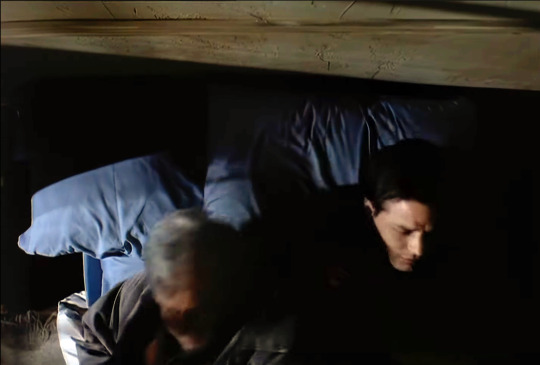
Next, he has these pillows set up next to each other. I'm the most intrigued by this one because the pillow on the left is like totally hanging off the bed. I understand the pillows are placed like this for actor comfort, but from a Watsonian perspective, I have to wonder why he's basically half-stacked the pillows on each other.
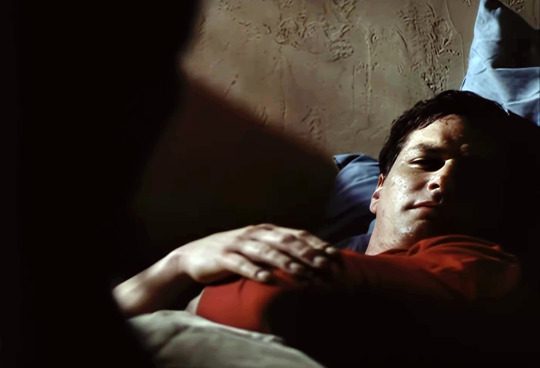
Lastly in the episode, I know you can't quite see it in this screenshot, but the pillows are lying on top of each other, one perpendicular to the other. Which means he's sort of propped up a bit as he sleeps.
I wondered what the historical data told us about his pillow situation, so I flipped back to Victoria's Secret and found two pillows again. Same bedding too, which I appreciate the continuity.
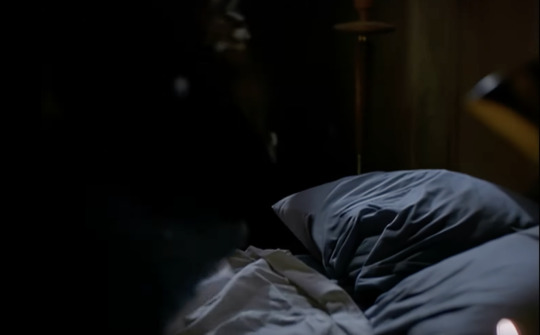
Seen here again from another angle.
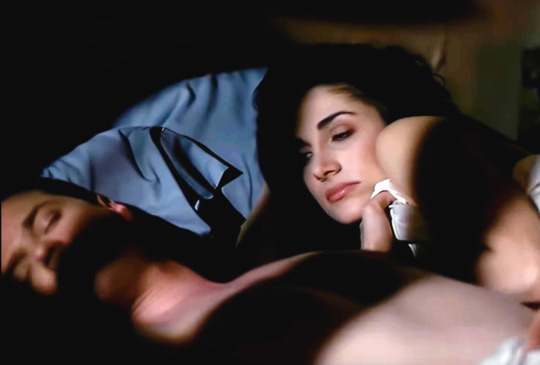
So then I wondered what the setup in the consulate was and, with some help, found this shot in Bounty Hunter, which clearly shows what I presume is his bed.
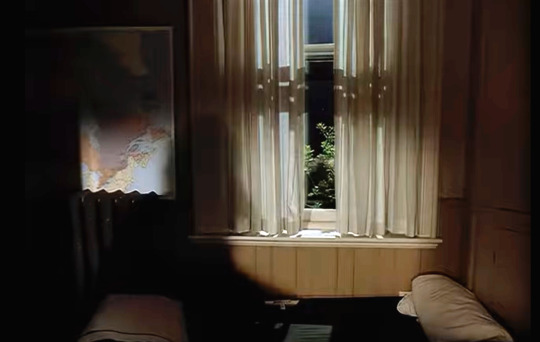
Only one pillow! Has he become more ascetic since the apartment burnt down, or is he a little denying himself that extra level of comfort? Mostly likely in my opinion, is that he sees this as a temporary set up and he isn't investing in nice things for a space that isn't his.
Lastly, I wondered about another memorable time we see Fraser sleeping, and I jumped over to A Likely Story for the camping scenes.
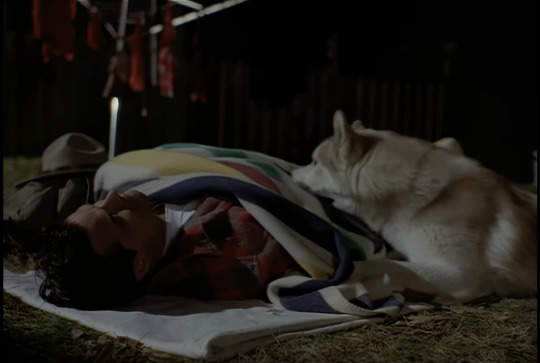
Apparently, when camping, he forgoes the pillow altogether, which must be torture on his head. This is made all the more funny when Ray K shows up with a pillow.
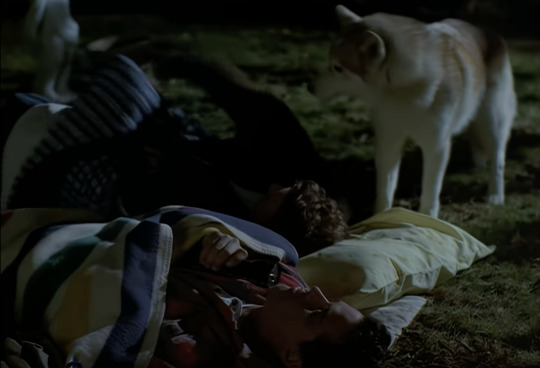
Looking at these different examples, I think Fraser's pillow usage increases when he feels safe and comfortable. Alone in the privacy of your home? Two pillows. Alone is a weird empty consulate office on an uncomfortable cot? One pillow. On a sort of sleepover stakeout? None.
Side note: If anyone remembers any other Fraser-in-bed shots let me know, I'd love to add them!
#this legitimately captured my attention and made me scour footage for the like two hours to put this together#this is my retroactive submission to character week under the meta category#ds30below#due south
75 notes
·
View notes
Text
What does Aziraphale know, and when does he know it? Part 1
Prologue, for those who haven't seen it.
Zira's first encounter with the Metatron in the Final Fifteen Minutes is when the Metatron walks into the bookshop disguised as mild-mannered Derek Jacobi human and interrupts Michael, who is threatening Aziraphale with total obliteration. He insults the archangels, then calls on them to say who he is. Aziraphale at this point -- we get one reaction shot of him -- appears to be in wary wait-and-see (heh) mode.
(Not wholly relevant here, but -- the first to show recognition of the Metatron isn't Crowley or Aziraphale, it's Saraqael, and isn't that interesting. I definitely have a meta in pickle about Saraqael, Heaven's Only Competent Angel.)
The Metatron then asks whether Crowley knows him. Aziraphale finds this intriguing, turning to Crowley with interest. Crowley does the-thing-that's-all-over-the-show-where-he-and-Aziraphale-drop-one-another-clues; rather than say the Metatron's name, he mentions his appearance as "big floating giant head." That's enough for Aziraphale to clue in and spill the beans, with genuine shock that the other angels (except Saraqael, again) echo.
What Aziraphale now knows that he hadn't known:
The Metatron has a human corporation. (Yes, he may have been Enoch-human in the past, but that's not entirely show canon yet; before now, Watsonianly, we've only seen the Big Giant Disembodied Head.)
The Metatron insults archangels. Labor angle here, incidentally: this is a manager insulting his employees in front of their supervisees (Aziraphale, Muriel) and even outsiders (Crowley). Management 101: DO NOT DO THIS, IT IS BAD. Praise in public, critique in private and without insults.
The Metatron and Crowley know one another. (Zero details on when, how, or why.)
The Metatron then dismisses Michael, Uriel, and Saraqael back to Heaven, talking down to them like Mary Poppins to the von Trapp children (seriously, "spit spot"? also, nice s1 callback). He even covertly threatens them! Uriel asks whether they have done anything wrong -- getting caught doing something wrong is fatal to an angel's identity as angel, as Aziraphale's concerned face in a brief reaction shot shows he knows -- and the Metatron only says ominously that that "remains to be seen."
After ordering the archangels off again, he openly hurls an ableist slur at Muriel rather than use their name, while demanding that they stay because "I may need you." This is a hardcore, shocking Villain Moment, y'all. The Metatron is Having A Moment. Pulling back to a Doylist perspective -- Neil freakin' Gaiman isn't going to drop a slur lightly. He's just not. He did it with full intent, and that intent is "the fucking Metatron is ableist trash." Returning to the Watsonian viewpoint, however...
What Aziraphale now knows that he hadn't known:
The Metatron wears scorn like royal vestments. It's pretty basic to how he treats others. (Doylistly: this tracks with both s1 and what we see of him in the recorded meetings that Crowley, Muriel, and Saraqael view. "Oh, don't be so wet!" he snarls at Saraqael, just for starters.)
The Metatron can order archangels around like children, even threaten them with judgment and punishment, and get away with it.
The Metatron doesn't just punch sideways-ish at the archangels, which might be justifiable; the Metatron absolutely punches down with his scorn. And wow, does he ever not pull his punches.
The Metatron thinks he's entitled to use others to serve his own needs.
If Aziraphale hasn't figured out by now that the Metatron abuses his quite substantial and dangerous power, he's not the angel I think he is. (As for Crowley, he's been absolutely leveled -- look at him sprawled out all but flat on Aziraphale's desk chair! He's not really paying attention. Also, per e3 he kind of agrees with the Metatron about Muriel, though he never himself uses ableist language about them.)
The Metatron says "Right," and we see Aziraphale again. Is he happy? He is not. Body held tense and straight, arms at his sides (though he looks about to clasp his hands together in front, a worry sign), face even warier. Seems a reasonable reaction to what he's just seen!
"It's just you and me, Aziraphale, eh?" It's damned blessed bloody well not. Crowley's right there, Muriel's right there, and the Metatron just erased both from consideration. RUDE! "I think we need to have a bit of a chinwag, don't you?" Aziraphale in both words and body would very much rather not, and I can't blame him one bit.
The Metatron then forces a bribe on Aziraphale, in the form of The Coffee That Launched A Thousand Metas. Aziraphale isn't clear on what the Metatron wants of him at this point -- "shall I drink it?" There's a striking parallel here to Crowleian temptations via novel experiences that other meta-ists have pointed out; like those, Aziraphale's reaction is positive ("it's very nice") but unlike them, it's decidedly subdued, scaled way down -- Zira certainly doesn't guzzle the coffee the way he inhaled the ox-rib. The Metatron indicates that getting a positive reaction from Aziraphale is the point ("well, I should jolly well hope so!") and verbally forces Aziraphale out the door for a Crowley-less, Muriel-less discussion.
Aziraphale is... less than enthusiastic, turning toward Crowley -- possibly to accompany him, possibly for a lead on how to handle this. Crowley, still in a state of exhaustion and bogglement, misses the cue. Oh, Crowley. Gargantuan, awful mistake! Totally understandable, of course, but Aziraphale needs a rescue here badly and (for the first time ever?) Crowley doesn't provide one!
Aziraphale's walk toward the bookshop door is diffident, halting. He glances back at the Metatron and Crowley as he goes.
What Aziraphale knows at this point:
The Metatron wants something from him. Just him, not Crowley or Muriel.
Rather than straight-up asking, rather than ordering (as he could perfectly well do), the Metatron is loading the dice with a Crowleyesque bribe/temptation. This is a slight hint (which the Metatron will shortly confirm) that the Metatron knows some things about the Crowley-Aziraphale dynamic.
What Aziraphale likely wants to know at this point:
What the hell the heaven on earth does the Metatron want from him?
And why might he need Muriel?
And we are all Aziraphale -- we all want to know too!
This is more than long enough for a post, so let's post it. Next up: The Chinwag.
#gos2spoilers#gos2 spoilers#good omens season 2 spoilers#the fucking metatron#michael#uriel#saraqael#angel muriel#crowley#aziraphale#the coffee that launched a thousand metas#tw ableism#cw ableism#it's only mentioned but it's real#the final fifteen minutes#good omens meta#good omens
183 notes
·
View notes
Text
There’s something I love about Battletech that I’ve only now figured out how to word, and it’s the way ‘Mechs are treated in the setting (capitalized that way because in universe it’s short for BattleMechs).
If you’re not familiar with this line of thinking, let me introduce it a moment. In short, one of the things that mecha as a genre does is use mechs because they’re human-looking. It lets you take mechanized warfare, something famously cruel and dehumanizing, and humanize it, making it once again about lone heroic actors that tower over the battlefield. That can do a lot of things in a piece: it can let you really understand the emotional impact, war-is-hell style; it can be vaguely propaganda-y/wish fulfillment, in the sense that it defies the idea that one person alone can’t make a difference; it can even be used to make combat a person-to-person backdrop for what’s really going on (you could do a rom-com with mechs pretty neatly I think…wonder if that exists?)
Battletech seems to have this line of thinking built into the setting. From a Doylist perspective, I can’t guarantee it was on purpose, but shut up we’re going off the Watsonian rails.
The setting goes straight into it with the view people have of MechWarriors, the class of soldier that pilots Battlemechs across the battlefields of the Inner Sphere. The setting (especially in older eras) treats these warriors as knights-errant, crusading about in massive suits of armor for whatever cause they believe right--even if that cause is a bit of coin. Chivalric orders at one point really did and occasionally still do within the Battletech universe, and (again, earlier on in the setting) mechs are often passed down through family lines, making these machines into a symbol. What that symbol exactly represents depends from MechWarrior to MechWarrior, but no matter what it means something to them. They have some form of relationship with what it means to be a MechWarrior. To be one of these glorious knights.
But then, as all things must, it all comes crashing down when faced with the horrors of real life and the real-life battlefield. 'Mechs aren't invincible, far from it; they certainly aren't disposable, but in addition to other 'Mechs (the "romantic" opponent all MechWarriors wish to fight) they are under threat from VTOL craft, planes, tanks, artillery, and even properly trained infantry. The glorious knight, striding across the battlefield...can very easily lose their lives to their own notions of splendor. Combat, both in lore and on the tabletop, is brutal, and 'Mechs even if they survive often come away with massive holes, missing limbs, and pilots bloodied and bruised even from the safety of the cockpit. To say nothing of those that don't make it home, their ammunition reserves sending them up in a fireball of death, their reactors purged in superheated steam that could leak into the cockpit and boil them alive, their cockpit itself blasted from off the 'Mech's shoulders and leaving them nothing but a fine red paste. BattleMechs are glorious, yes, but at the end of the day it's still war.
It's still war. And war is hell.
So despite having the appearance of being an empowering machine in-universe, we can actually look at the BattleMech as symbolic of the kind of thing that really happens to people thrown into the grinder of war--they die. And it's not pretty. No idealism can protect you from the barrel of a gun. And you are most certainly cheaper to replace than all your equipment.
The designs of the 'Mechs lean into this depersonalizing angle, too. Many of them are, in the barest sense, humanoid:
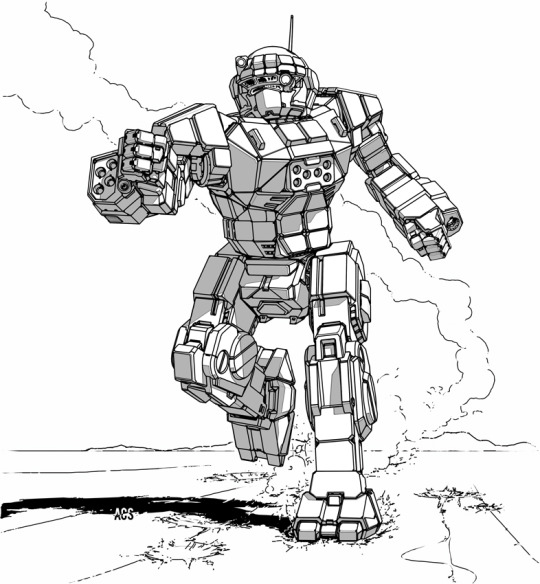
But even then, it's the vision of a human filtered through a much more realistic military-industrial complex than something like, say, Gundam. And on the other end of this spectrum:

...are 'Mechs that look nothing like the people they're supposed to represent.
Looking at this through the lens of 'Mechs as something used to tell a story about humans, we reach a conclusion:
You think this story is about you. It's not. War is hell. Meat is cheap.
And that's actually really cool of Battletech to be so thematically tied into itself like that.
40 notes
·
View notes
Note
Very unpopular opinion: I don't like Alfred. I can't handle the hypocrisy of canon and fanon treating him like he's some sort of angle while ignoring the bad stuff he's done and how he's an enabler, and that disconnect has him on the bottom of my ranking.
ohoho spicy. most unpopular opinions around here are still at least very popular among a small subgroup, but this is tasty, anon.
And you know what? I get it.
Alfred's an odd character narratively. He was surely never intended to be an enabler. He was a sort of "only sane man" snarky side character here to contrast with our lead, Batman, and point out all the ridiculous things Bruce did, but never have any true power to stop them.
Except. He does. Alfred's close relationship with Bruce, who values both his presence and his opinion, gives him a lot of power--and any modern version of the character, who was not just around since Bruce's childhood but very likely raised him for half of it, has even more.
So we ended up with this guy who is (Doylist) a side character and can't actually affect the story that much, but whose whole shtick is dryly pointing it stupid ideas and bad behavior. Which (Watsonian) leads to a man who is explicitly aware of all the bad stuff being done around him, and makes witty little comments, but doesn't actually do anything to stop it. And rarely even tries!
imo, Being an enabler is a core part of Alfred's characterization.
Which is one thing, and can be kinda entertaining, when what he's enabling is "man dresses like a bat to fight crime". Alfred, who pretends to be above it all and find it silly, but deep down believes in Batman despite himself and is just as crazy as the actual vigilantes? Lots of room to play.
But when what he's enabling is, say, his son-figure emotionally abusing his own kids, or putting overly high expectations on them, or kicking them out of the house...then it's a whole lot darker.
A lot of the fanon that turns Alfred into a perfect angel also turns Bruce into a good dad, avoiding that particular pitfall. But instead he gets treated as always knowing everything and always being liked by everyone, which (is boring as hell and) sends us right back to the "why isn't he doing anything??" problem whenever there is an issue that he is shown to definitely know about and know a perfect solution to, and yet...declines to solve it for some reason.
In the end, idk if I have a super strong opinion on Alfred overall. There are small ways to make him better or worse. But I do have a strong opinion that, damn, he is absofuckinglutely not perfect.
(Also, separately, you are so right about a disconnect being the most annoying thing about many characters. Most of my least favorite fictional characters are the ones who were blatantly favored by their creators and act stupidly/cruelly/whatever, but somehow get treated as the coolest and smartest anyway. Plus, who among us hasn't started to resent a character we were previously neutral about because of annoying fans?)
#*#ask#anon#*dc#dc#alfred pennyworth#batfam#i guess this is tangentially a part of the discussion on#batman's c+ parenting
351 notes
·
View notes
Text
By the Neck; or, Pearls Mean Tears
I know we all love the idea that Ed snatched the pearl necklace from the neck of one of the guests (or possibly even the bride herself) on the wedding party boat, and how that ties in with his re-painted bride dolly and his longing to be Stede’s bride. I’ve been responsible for propagating the idea myself. So I hate to rain on our parade, but, oh my v. dears? We were wrong.
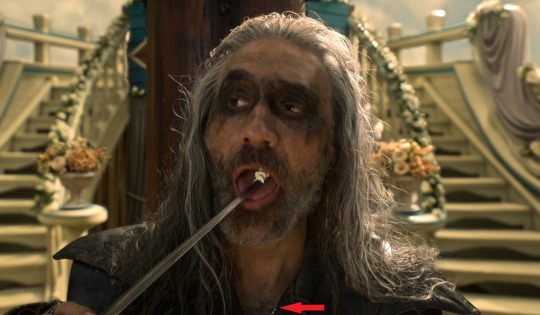
Stop looking at Ed’s soft, open mouth and beautiful, haunted eyes for a second, and take a glance at the bottom of the frame at what’s tucked up next to the left lapel of his big Blackbeard duster (srsly, how did I not notice those ridiculously oversized lapels in the trailer? I am so dumb sometimes). And lest you think that he, perhaps snatched the necklace sometime between unleashing “the kids” and the camera cutting back to him nonchalantly enjoying some cake?
Here’s the necklace on “the day before that,” visible just under the curve of the top pistol on his chest:

And here it is again “the day before that,” two pearls on the strand just barely visible as he’s lighting his pipe:
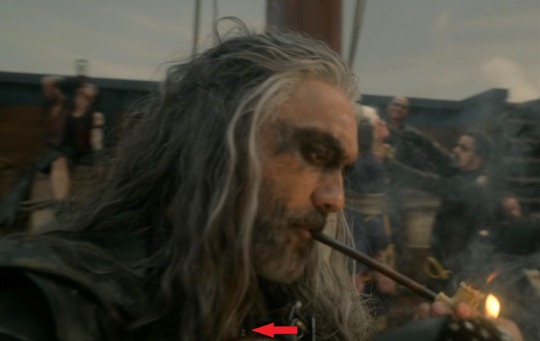
So sorry my v. dears, but no. the pearls don’t represent his desire to be partnered with Stede. But that’s ok - we already have a piece of neckware that represents that: Stede’s cravat. Which Ed donned specifically so that he could die in it…

And we know that he did that, because he was only wearing the pearl necklace and his habitual gold chains from the first season just before he babygirled his way right into the path of the storm. (Also - since the crew were huddled in the hallway leading to the captain’s cabin just before they came out to find Ed angling the cannon toward the mast, do we reckon he already had it on him when he came out to take the helm? Maybe tucked away in his pocket? Where he used to keep his silk?)
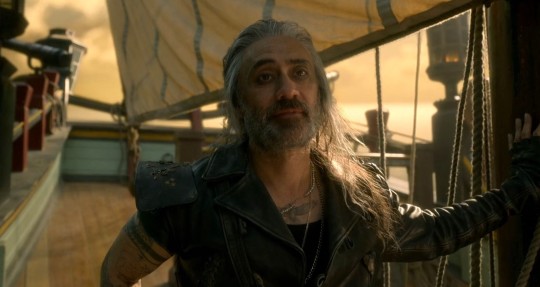
But! When Ed gets to the Gravy Basket, only the pearls remain.
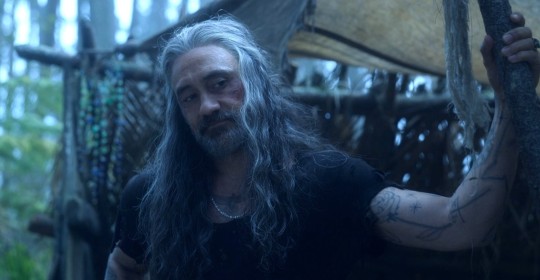
Similarly when he’s manacled to the railing after he awakens from his coma, he’s only wearing the pearls. There’s no good Watsonian reason to take the cravat and the chains, but LEAVE the pearls. If the characters were worried about him choking, it would make sense to remove ALL the neckwear. If Stede wanted his clothes back for some reason or Ed didn’t want it now that Stede’s back and he’s mad at him, removing the cravat makes sense, but why remove the jewelry that rightly belongs to Ed, meaning he’d still have his chains along with the pearls. If it was a matter of the crew taking Ed’s valuables as an asshole tax or something, then we’d expect chains AND pearls to be gone, leaving just the cravat. I can’t think of a single in-universe reason why only the pearls would stay.

That tells us that the pearls are SYMBOLICALLY significant to his character concept and, especially since they show up in the Gravy Basket where EVERYTHING is symbolic, integrated into his concept of self.
So if not all the bridal stuff, how ARE we meant to interpret them?
Well, first, pearls are tied to the sea, and I think it’s fair to say that in almost all iterations of his identity, Ed sees himself intrinsically linked with or near the sea (The Pirate Blackbeard, The Kraken, the Impossible Bird that never returns to land, Jeff’s Inn by the Sea, Blackbeard’s Bar and Grill and other Delicacies and Delights and Fishing Equipment, and Fisherman Ed). But various mythologies posit pearls are the tears of gods or goddesses, intrinsically linking them with expressions of sorrow. And beyond that, there’s What Pearls Are - an irritant that has to be smoothed over with layer upon layer of visually appealing cover to make it acceptable.
We know that Ed thinks he’s profoundly unlovable. He admits it to himself in as many words in the Gravy Basket, but we’ve known this from season 1 when he confessed to Stede that he’s not a good person, and that’s why he hasn’t any friends. We see plenty of people with whom he is on friendly terms, like Jack or Anne and Mary, or who respect or admire Blackbeard, like his crew and Spanish Jackie, and Jeff easily wins over the crowd on the French Party Boat, but Blackbeard and Jeff are protective personas he cultured like layers of nacre. They’re not Just Ed.
Just Ed made himself profoundly vulnerable and kissed a boy on a beach. Just Ed got abandoned on a dock. Just Ed got told that it would have been better if the English had killed him.
So I think it’s significant that he and Stede exchange their second kiss when he’s been stripped of his pearls in exchange for a cat bell.

This is Ed devoid of all the signifiers of his self-constructed identities - just like on the beach with his clean-shaved face and standard-issue academy uniform - no pretenses to hide behind. He’s able to be soft and vulnerable and honest - expressing desire and being receptive of it, clearly establishing his needs and boundaries. He’s able to be Just Ed and be loved and accepted for it.
So what does it mean that, once the cat-bell era is over, Ed choses to put the pearls back on?
I think it’s telling that, after a brief interlude with Ned Low, we start episode 6 with Ed in two scenes where he’s in a state of low-grade anxiety over the fruits of his Kraken era. First, we see him scanning a horizon for a storm that he can feel, but not see, which, as pointed out by @edsbacktattoo is more or less a premonition about the impending arrival of Ned Low, whom Kraken!Ed goaded into coming for him by breaking his consecutive raid record in a bid of passive suicidality. Then, we have Ed’s room of gilded guilt. All this represents, to Ed, tangible evidence of his inherent toxicity - the rotten core of him that has to be smoothed over.

I think it’s also significant that the pearls are there for the sex scene at the end of the episode.
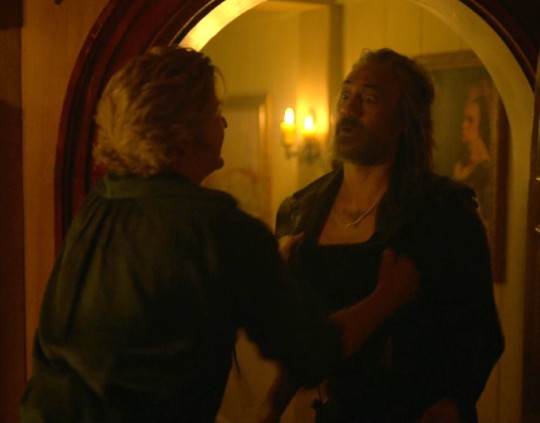
Unlike the scene at the end of episode 5, this is NOT Ed giving and receiving love on his own terms. Ned’s appearance was his fault - the result of his recklessness and self-destruction, and Stede is the one who has paid the price for it. Ed consents to sex, though he wanted to take things slow, and is not really ready, but it’s by no means enthusiastic. It’s relenting. It’s a way of smoothing things over for and with Stede rather than addressing the underlying agitation.
Even though Ed rids himself of his leathers - the last trappings of his Blackbeard persona, dropped overboard just like the bride doll he painted in his image - he keeps the pearls when he assumes his “just a regular guy” guise.
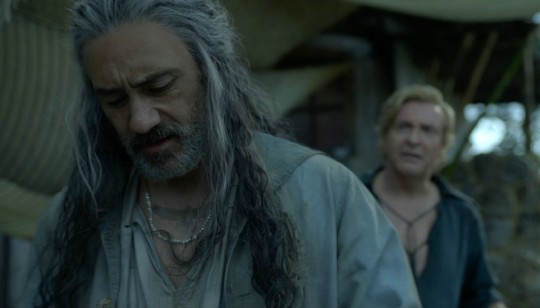
Because this isn’t really Ed expressing and embracing his authentic self. Fisherman Ed is just another palatable persona (a whim borne on the back of one caught fish, because if the people in his life are going to keep telling him he’s whim-prone, he may as well lean all the way in and prove them right, right?). All the same underlying anxiety about being unlovable is still there, and it’s thrown into overdrive now that everyone wants a piece of Stede. After all, if he REALLY loves Stede, would it not be best to release him from the obligation of being tied to someone so fundamentally damaged? Let him find someone who can TRULY make him happy now that he can have his pick? So he picks a fight to push Stede away - tells him that their first time together was “a mistake,” tells him that he’s leaving (again), tells him that fishermen and pirates (read: Ed and Stede) have nothing in common.
So, while they are lovely, and he wears those fine things well, I hope that we might soon see the end of the strand of pearls. Because for Ed, pearls mean tears.
83 notes
·
View notes
Text
alright yeah if we're gonna go into it - that post fails on its own merits, too because... you're not actually 'giving the power away'!
the whole, entire conceit of superhero media is that you cannot share this power. you are strong and everyone else is helpless and weak. using your power to defend them does not change the fact that you are separate from and above them - the helpless public are not somehow being given the power to defend themselves and act on their own, they still have to wait for the special body of a strong-armed man to come and save them. it's a charity mindset - there are people who need to be helped, and people who can help. what it is not is empowerment of any sort. if spiderman goes away, it's not like the passengers of a runaway subway-train will somehow have developed the skills to stop the train on their own. they don't have webs and super-strength - he still has all the power!
and like, furthermore, that's not fucking 'leftism'! it's 'sheep and sheepdogs' ideology, which is one of the most common, shared reactionary framings of violence! the public at large being weak and witless, preyed upon by dangerous people separate from the public, and needing to be defended by the brave few - that is exactly the view that both your garden-variety concealed-carrier as well as any given neonazi would hold! by this metric, the home-invasion scene in American History X would qualify as some sort of radical anarchist hope-punk masterpiece! 'but the ubermensch do Good things' is a silly, watsonian angle that presupposes that 'thinking the stuff you're doing is Good and not Bad' is some quality unique to 'leftism' - and ignores entirely the ideas communicated by the existence of ubermensch within a story someone's telling
the underlying gist of the whole argument - that reactionary concepts in culture comes from Above, packaged into media at some unseen point, and that the engagement by the audience is somehow free from that reaction - is silly and defensive. the way The People engage with the power fantasy is not going to magically be pure and 'leftist', they still Live In A Society as much as the writers do
145 notes
·
View notes
Text
Watsonian vs Doylist Analyses - A Couple Points of Clarification
I just want to clear up a couple of misunderstandings I may have unintentionally contributed to in my previous references on the subject:
1. There can be multiple explanations (multiple Watsonian explanations, multiple Doylist explanations, multiple of each etc) of a given scene or character portrayal or plot point, and people can accept more than one explanation at the same time. It's just uncommon for people to accept or present multiple explanations at once because that's kind of how people people.
2. Doylist takes aren't inherently "better" than Watsonian takes, and vice versa. People use both to engage with the text in different ways and for different purposes. Watsonian logic is fun for roleplay or immersing yourself into the story, and I imagine a lot of fanfic writers often start from a prompt like "I wonder what would happen next if I took x character and then put them in y scenario". Doylist logic is fun if you like examining the text from a more "meta" standpoint, trying to see what purpose various narrative choices serve (or undermine). Neither angle is intrinsically a more valid way to engage with fiction, and you might enjoy doing one thing one day and another thing the next - with different texts or even with the same text.
In litcrit, because I like to pick my brain on the subject of "what would have made for the best story here", I tend to be more interested in analyzing theme, character arcs, setup and payoff etc, which are Doylist interpretations. Some people focus a lot on authorial intent, which is also a Doylist perspective (just a different one). Some people like to try to get into the heads of the characters they're analyzing and discuss ideas like "what choice would make the most sense for x character given who they are as a person". That's a Watsonian take. There are contextual and individual reasons why some explanations may resonate with you more than others some of the time or even most of the time, but they're really apples and oranges. Which one you prefer will likely vary depending on the type of question being posed and what scope seems to be the most appropriate for it - and people are always going to have different opinions about that too... because that's how people people.
Of course, the opinions I personally care enough about to splash all over the internet are going to be opinions I hold with very strong convictions, which is why I can come off quite aggressive about them, but they're still just opinions and there's no such thing as "one true explanation", whether that's Watsonian or Doylist. If I make a Doylist argument and I dismiss someone else's rebuttal on the basis of it being Watsonian, that's not because Watsonian takes are intrinsically weaker, it's just because you generally can't use a Watsonian take to rebut a Doylist one or vice versa. You need to engage with someone's point in order to counter it, and you can't generally do that when you completely change the scope of the question, which is what tends to happen when a Watsonian perspective and a Doylist perspective comes into conflict.
(Of course, you can argue that a Doylist scope is situationally stronger than a Watsonian one or vice versa, but that's a different argument and usually context-dependent lol - point is just because a Doylist answer might fit one particular prompt much better this time, doesn't mean all Doylist answers will always trump all Watsonian answers in every single context all of the time, and that's not even accounting for the fact that you're never going to reach unanimous agreement about these sorts of things anyway.)
I hope that clears things up 😊
#litcrit#watsonian vs doylist#apples and oranges#long post#text post#side note but this is why I tend to only engage in Watsonian logic myself when I'm the one doing the rebutting#I don't usually care to come out with my own Watsonian takes#but occasionally I'll come across someone else's that seems totally bonkers#and unsubstantiated by anything#at which point I'll put the Watsonian hat on so I can engage 😂#otherwise I prefer my trusty Doylist hats 😁 ✌
20 notes
·
View notes
Note
Hey pika, random question ramble.
Hori often changes up how he draws Izuku, especially during fights, where he turns from little baby man to Shonen Protagonist. Is it possible that OFA has given Izuku a bit of AllMightification in terms of how he's drawn? Is he just so strong now he gets to be sharp angles and sleek lines, rather than round and all cheeks and tears and smiles?m? Or is it just Hori's style adjusting as the manga progresses?
I'd like to hear your thoughts on this. The art style tells as much a story as the text so perhaps you could offer some insight.
Please look up Doylist vs Watsonian literary perspectives lol.
Horikoshi's drawing style changes for two reasons:
His art just gets better over time
His style changes to reflect the mood of the scene
It sounds like you're talking about something that is the result of reason #2. Horikoshi draws his characters all silly during funny scenes and all pretty during serious scenes and all normal during normal scenes. You have to find a noticeable departure not just from the mood but from the regular art style of MHA in general, like with All Might or Dark Deku, to identify something that may have in-universe meaning like that.
I would say Izuku is drawn so well right now because it's important to the emotion the scene is trying to convey. Horikoshi is putting extra time and effort into the panels that he wants to convey the most emotion. I don't think it's a reflection of anything happening in-universe like Izuku getting an "All Might form."
31 notes
·
View notes
Note
you have a hyper-doylist take on media criticism that I disagree with fully and strongly but am still very interested in. why is it that you reject watsonian media analysis consistently even when doing so doesn't make a lot of sense?
i mean fundamentally it's because i am a marxist & specifically a materialist and i come at all my analysis from this angle. doyle was real & watson wasn't--the doylist factors have a de facto existence that the watsonian elements do not. i do not believe in the existence of anything non-physical and that includes 'ideas' or 'thoughts' as having any independent existence outside of the ways they are expressed upon the world through speech and action
85 notes
·
View notes
Text
oKAY
hey kevin that bit about ‘felt like i couldn’t live without him’ the FUCK WAS THAT ABOUT
not even in a quibble way it’s just that it’s such a Choice at this stage in the proceedings?? like it’s a Way of Putting It that’s got interesting ramifications both from a Watsonian and Doylist perspective given how far Juno has come and what he knows he can do (also feels a bit like an echo of Buddy's wedding vows just a bit and oh boy I'm filing that one away for further consideration)
while we're here I'm still trying to figure out where we’re at with ‘how I felt about him later’, like was that something that stayed within s4 that was foreshadowing juno’s reaction to the rest of the journal or are we looking at further payoff or is that complicated in that the layers of feelings are complicated and there's not meant to be an explicit corresponding payoff because it's inlaid in the process and continually unfolding or???
god actually i was getting a lot out of this episode i feel like i need to go back and relisten bc there were a lot of understated banger lines that felt like they had serious thematic relevance/were gonna be important later
especially the ones about memory but also Dr. Lawrence's bit about guilt bc the show has chased a number of different angles on guilt and responsibility and closure and iirc in the Q and A they talked about redemption-but-broadly-and-not-exactly-or-not-in-the-way-you're-thinking kind of redemption being a key theme for the season
also 'wrestling the octopus' is probably going up there in the gallery with ‘wow miasma ate a lot of soup’ and 'have you ever heard a goldfish scream, young man’
#also the vibes were great#hoping they follow through on this one a little more thoroughly than they did with Vanishing Act#like the set-up there was really neat but the part two felt like it really separated the theatre plot from the confrontation#where past episodes seemed like they've given more equal emotional weight to the arc within the episode#in a way that also lends itself to the broader arc#like vicky's part at the end of midnight fox really sticks out for me#i've always been endeared by how much they made the side-characters real people even within the confines of recognizable genre roles#and i'd hate to see that fall by the wayside#you cannot just distract me with stinky thief man#i see you with your villain mustache#the penumbra podcast#juno steel
34 notes
·
View notes
Text
I saw some people be wrong on the internet, and I literally couldn't sleep until I posted about it, so quickly, just to get it out of my system:
Are Death of the Author and Doylist interpretations fundamentally incompatible?
Answer: How the fuck am I supposed to know? I got a STEM degree, all that humanities stuff is just a hobby for me. Have you tried reading Roland Barthes's essay? Incomprehensible! (Actually, if you spend a few moments parsing each paragraph instead of trying to plow through, it is a really fascinating read, and it's not even that long.)
Okay but you do have an opinion, right? That's why you made that post after all.
Sure, the stuff above was just to warn you that this is going to be incomplete and wrong. With any luck someone who actually understands it will come along and write a better version of this post, and then I can reblog that and we will all learn something.
Anyway: So I think calling them incompatible is misunderstanding what these terms mean.
Doylist and Watsonian are fandom terms to explain text from a fandom perspective. From the Watsonian perspective, Sherlock Holmes's, I dunno, hair colour changing because he dyes it or because Watson's eyesight is getting poorer; for some in-universe reason. From a Doylist perspective, it's because the author couldn't be bothered to remember details like that.
Death of the Author is the other side of a whole other dialectic. It's a response to Auteur Theory (I'm using the term incorrectly here because it fits so nicely); the idea that a text represents an author, and that you can only find the true meaning of the text if you understand the author as well. Oh, and also, that there is a true meaning to the text as well. Barthes says fundamentally: Who cares about the author as a person? What matters is the text, and it has no "true meaning" except that which the reader sees in it.
(People on the internet sometimes act like Death of the Author is how you're supposed to read texts, the correct way. I disagree. It's one valid approach, not the only one. It's okay if we look at the same text from different angles and see different things in it; in fact, that's what the essay itself says.)
When it comes to things like untangling the narrative structure, or figuring out what the role of a character is, it's absolutely possible to be Doylist and follow Death of the Author at the same time. For example, the role of a character as the leader, the love interest, the bully or similar, and how that role changes over the course of the story: That is a thing that requires a Doylist view (to the extent that this question even makes sense), but it's possible to answer this fully from the contents of the text. You can ignore who the author is, what else they wrote, and anything they ever said on Twitter.
(You don't have to do that, of course. You can analyse a character or a moment in light of the author's other work, and that is often very interesting as well. I'm just saying, it is a valid option either way.)
So no, Death of the Author and Doylist explanations are not incompatible. Death of the Author does not mean that you have to assume the story has no structure and no intentionality, it just means that the person who wrote the text is perhaps not the most important thing about it.
8 notes
·
View notes
Note
Okay, so I found this meta (https://slashmarks.tumblr.com/post/626830726168444928/did-the-grangers-commit-child-abandonment-or) and like, where are Hermione’s parents? We see them like twice, she mails them once and we don’t see them mail her anything, and they are totally okay with Hermione spending the vast majority of her time at her friend’s house. Do they even exist or did Hermione just spring into existence as an 11 year old like Athena?
sksksks i understand that they were just. utterly useless to the plot so we just—don’t get anything about them but from a watsonian angle, it’s just really funny lol maybe hermione parallels matilda in more ways than just one? and learnt how to take care of herself and became hyper-independent from a ridiculously young age like u have this 1.5yo with bushy hair larger than her upper body, dressed in tiny dungarees, carrying too many books around the house. her parents are always just like ‘yes that’s great hermione’ bc they’re always so busy and absentminded that all they can do is just. a pat on the head.
and this trend carries into hogwarts as well; they’re not talked about because hermione doesn’t need them, at all. she can just do everything herself with ruthless efficiency. and that would explain her decision to obliviate them even better no? hermione operates on the practicality spectrum, she does what needs to be done, always has, because that’s how she’s survived. and if her birthdgivers, who she cares for a perfectly perfunctory amount, can be saved by a little ykno morally grey action—then well, what’s the harm? it’s not like they knew they had a daughter her whole life anyway how would this make a difference?
#hermione granger#the idea of her springing up like athena tho….#utterly hilarious#can see it happening too#but also just. who’s giving me the matilda hermione au now#it all fits together so well#and it’s like#a common enough hc in fandom that hermione’s fav book wa smatilda wasn’t it? bc she could relate so much?#this is the next logical step lol#pen’s asks
15 notes
·
View notes